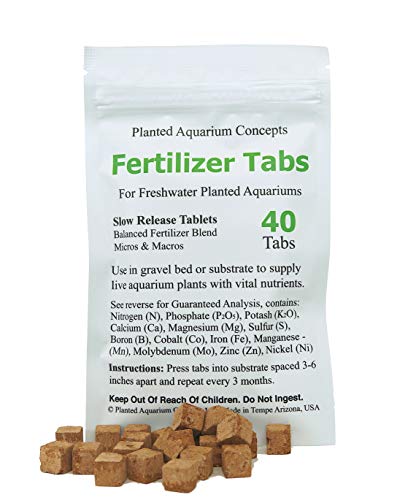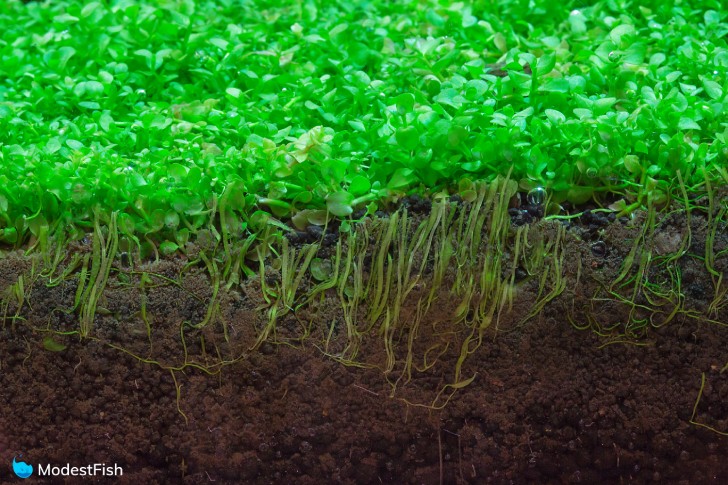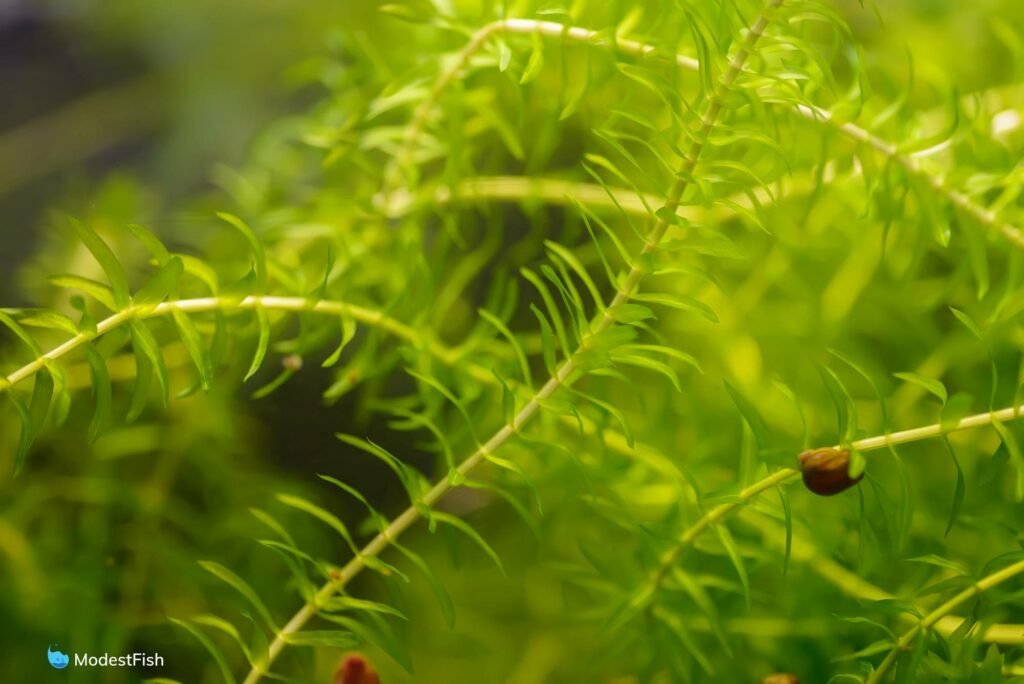Root tabs are a great way to deliver fertilizer to root-feeding plants, like Amazon swords, vallisneria or sagittaria.
They’re a great way to supplement your plants, even if you don’t have nutrient rich plant substrate.
But, root tabs are powerful fertilizers that aren’t suited to every tank.
Today, I’ll go over what kind of tanks do and don’t need root tabs, and then some of the different kinds of root tabs that are available on the market, so you can make the best choice for your aquarium.
Overview On Root Tabs
Not every tank needs root tabs, far from it, in fact. Tabs are very concentrated fertilizers that can leach nutrients into the water, sometimes faster than plants can use them; proceed with caution.
But, if you’ve got a heavily planted tank, populated by heavy root feeders, tabs may be just the thing to provide a steady flow of nutrients to your hungry plants.
I recommend adding a very small number of tabs and then monitoring your water parameters to ensure there are no spikes in nitrites/nitrates or GH.
| Preview | Product | |
|---|---|---|
 |
Seachem Flourish Tabs Growth Supplement - Aquatic Plant Stimulant 40 ct | Buy on Amazon |
 |
API 3 Pack Root Tabs Freshwater Aquarium Plant Fertilizer, 10 Tablets Per Box | Buy on Amazon |
 |
Aquarium Plant Root Fertilizer Tabs 40 Count | Buy on Amazon |
Last update on 2024-02-22 / Commissions Earned / Images from Amazon Product Advertising API
Table of Contents
Does Every Planted Tank Need Root Tabs?
Nope.
Root tabs have some seriously concentrated fertilizers that can be too much for small, low-tech tanks to handle.
If you have low lighting, slower growing plants, with no CO2, you likely don’t need root tabs at all. You’d likely get better results from liquid fertilizers that make it easier to control nutrient levels within your tank.
Tabs leach nutrients into the water as they break down, and you really can’t control the rate at which they do this.
Sometimes, they break down too quickly and cause the GH and other parameters to rise beyond healthy levels faster than the plants can use up the nutrients. This can be detrimental to fish and invertebrates in your aquarium.
Please, be careful!
Can Root Tabs Cause Nitrite/Nitrate Spikes?
Yes!
Please, be aware, that as they dissolve, root tabs can put off nitrite and nitrate.
If you’re just starting out using this kind of fertilizer, add just a few tabs, wait a few days, and then test your water parameters.
Adding too many root tabs all at once can cause spikes that may stress your fish.
Start slowly and keep your eye on your water parameters. Add one or two tabs (do not ever add more than the directions recommend!!), and monitor how your water is affected.
If your parameters start to get to unhealthy levels, I recommend digging up the tabs to prevent more fertilizers from being released, as well as frequent water changes.
For an in-depth comparison of aquarium testing kits, please, see our article, here.
Which Plants Benefit from Root Tabs?

Heavy root-feeding plants get the most benefit from root tabs.
Most carpeting plants draw a lot of nutrients from the substrate, species like dwarf baby tears, dwarf sagittaria, dwarf hair grass.
If your substrate is not very nutrient rich, you can supplement it with root tabs to help lush plants like these grow in a thick mat along the bottom of your tank.
Cryptocorynes also love root tabs. The tabs provide a ready flow of nutrients as they dissolve that the crypts will gladly tap into.
Larger root-feeding plants, like Amazon swords and jungle vallisneria, will have much more lush growth, if they have fertilizer available for them to uptake through their roots.
What Kinds of Plants Don’t Benefit from Root Tabs?

Stem plants, like water wisteria, rotunda, anacharis, moneywort, pennywort, etc, get their nutrients directly from the water column and don’t get much benefit from root tabs.
I would recommend dosing the water column with liquid fertilizers, if you primarily have stem plants.
Also, epiphytic plants, like Java fern, anubias or various mosses, feed from the water column and don’t need root tabs.
Research the kinds of plants you have in your tank. Your plants may not benefit from root tabs. It’s easier to control nutrient levels when you dose with liquid fertilizers, so they’re a better choice for plants that don’t feed from their roots.
Best Root Tabs For Planted Tanks
Seachem Flourish Tabs
In general, you can’t go wrong with Seachem products. I pretty much consider them to be the highest industry standard in the aquarium trade.
Flourish Tabs contain both macro and micronutrients to help your plants grow.
They contain very rich fertilizers that are best suited to fast-growing plants in high tech tanks.
Contains:
- Nitrogen
- Phosphate
- Potassium
- Calcium
- Magnesium
- Sulfur
- Boron
- Cobalt
- Copper
- Iron
- Manganese
- Molybdenum
- Zinc

Last update on 2024-02-22 / Commissions Earned / Images from Amazon Product Advertising API
Planted Aquarium Concepts Fertilizer Tabs
These root tabs from Planted Aquarium Concepts are also nutrient rich and provide all of the macro and micronutrients your plants need to thrive.
Again, this is some high octane fertilizer, best suited to a high tech tank.
Contains:
- Nitrogen
- Phosphate
- Potassium
- Iron
- Magnesium
- Manganese
- Boron
- Zinc
- Molybdenum
- Calcium
- Nickel
- Cobalt
- Sulfur

Last update on 2024-02-22 / Commissions Earned / Images from Amazon Product Advertising API
API Root Tabs
API Root Tabs are a bit more basic, they only provide macronutrients and a bit of iron. But, they’re good for providing a small boost without the worry that they’ll increase the tank’s GH.
These are better suited to low tech tanks with plants that just need a little pick-me-up.
Contains:
- Nitrogen
- Phosphate
- Potassium
- Iron

Last update on 2024-02-22 / Commissions Earned / Images from Amazon Product Advertising API
Final Thoughts
Not every tank needs root tabs, far from it, in fact.
It’s only tanks with fast growing, root-feeding plants that really need root tabs.
Tabs are very concentrated fertilizers that can leach nutrients into the water, sometimes faster than plants can use them; proceed with caution.
But, if you’ve got a heavily planted tank, populated by heavy root feeders, tabs may be just the thing to provide a steady flow of nutrients to your hungry plants.
I recommend adding a very small number of tabs and then monitoring your water parameters to ensure there are no spikes in nitrites/nitrates or GH.
Take things slow and be careful.
If things really get out of whack, I recommend digging up the tabs, just to be safe.
I hope you find this article helpful.
I wish you and your fish the very best!
The post Best Root Tabs For Aquarium Plants: Do You Actually Need Them? (2024 Review) appeared first on Modest Fish.
